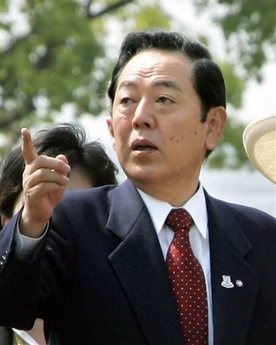报道:日本市长被歹徙杀死
TOKYO - The mayor of the Japanese city of Nagasaki was shot to death in a brazen attack Tuesday by an organized crime chief apparently enraged that the city refused to compensate him after his car was damaged at a public works construction site, news agencies reported.
 Nagasaki Mayor Iccho Ito guides Swedish King Carl XVI Gustav and Queen Silvia at the atomic bomb hypocenter in Nagasaki Peace Park in Nagasaki in this March 30, 2007 photo during the royal couple's trip to the southwestern Japanese city at the end of their week-long state visit to Japan. Ito was shot outside Nagasaki train station Tuesday, April 17, 2007, and is in critical condition, police said. [AP] |
The shooting was rare in a country where handguns are strictly banned and only four politicians are known to have been killed since World War II.
Mayor Iccho Ito, 61, was shot twice in the back at point-blank range outside a train station Tuesday evening, Nagasaki police official Rumi Tsujimoto said.
One of the bullets struck the mayor's heart and he went into cardiac arrest, according to Nagasaki University Hospital spokesman Kenzo Kusano. Kyodo News agency and national broadcaster NHK said Ito died of his wounds early Wednesday.
Tetsuya Shiroo, a senior member of Yamaguchi-gumi, Japan's largest organized crime syndicate, was wrestled to the ground by officers after the attack and arrested for attempted murder, police said.
He later admitted to shooting Ito with a handgun with the intent to kill, Nagasaki chief investigator Kazuki Umebayashi said at a news conference.
Prime Minister Shinzo Abe called for a "rigorous investigation."
It was the second attack in the last 20 years against a mayor of Nagasaki, which was destroyed by a U.S. atomic bomb in 1945 and whose leaders have actively campaigned against militarism.
In 1990, Mayor Hitoshi Motoshima was shot and seriously wounded after saying that Japan's emperor, beloved by rightists, bore some responsibility for World War II.
Tuesday's attack appeared to involve a more trivial matter, however.
Shiroo reportedly clashed with Nagasaki city officials in 2003 after his car was damaged when he drove into a hole at a public works site. He tried unsuccessfully to get compensation from the city after his insurance company refused to pay up, according to Japanese broadcaster NHK.
Shiroo also sent a letter to broadcaster TV Asahi to protest recent money scandals linked to Ito, including hidden accounts and public works contracts, Kyodo reported.
Backed by the ruling Liberal Democratic Party, Ito was campaigning for his fourth term in office before Sunday's elections. He was an active figure in the movement against nuclear proliferation, heading a coalition of Japanese cities calling for the elimination of nuclear weapons.
"Mayor Ito had a strong and boundless passion for peace," said Sunao Tsuboi, leader of a survivors' group based in Hiroshima, a city also flattened by a U.S. atomic bomb in 1945. "We all pray for his recovery."
Commonly known as yakuza, Japan's organized crime groups are typically involved in real estate and construction kickback schemes, extortion, gambling, the sex industry, gunrunning and drug trafficking.
The yakuza also have had a long-standing political alliance with right-wing nationalists in Japan, although authorities did not indicate that Tuesday's attack was politically motivated.
Organized crime groups are behind most shootings in Japan, with two-thirds of the country's 53 known shootings last year being gang-related, according to the National Police Agency. Police estimate there are about 84,500 gangsters across Japan.
Attacks on politicians in post-war Japan are extremely rare.
In 1960, Socialist leader Inejiro Asanuma was killed in an attack by a sword-wielding 17-year-old that riveted the nation.
In 2002, a ruling party politician was fatally stabbed in a dispute over political funds. In the 1990s, a Liberal Democrat lawmaker was killed at his home by his daughter and an opposition lawmaker was stabbed to death by a mental patient.
Last year, a right-wing extremist burned down the house of ruling party lawmaker Koichi Kato after the politician criticized then-Prime Minister Junichiro Koizumi's pilgrimage to a controversial Tokyo war shrine. No one was home at the time.
- 上一篇

- 下一篇



 手机网站
手机网站